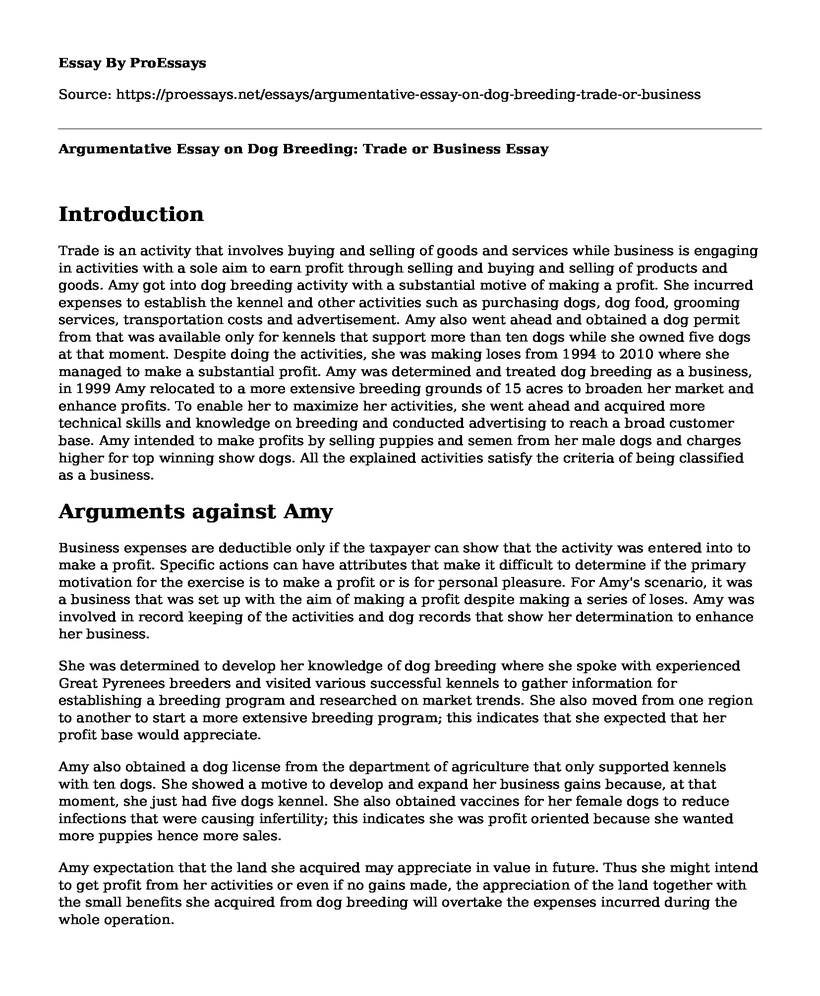Introduction
Trade is an activity that involves buying and selling of goods and services while business is engaging in activities with a sole aim to earn profit through selling and buying and selling of products and goods. Amy got into dog breeding activity with a substantial motive of making a profit. She incurred expenses to establish the kennel and other activities such as purchasing dogs, dog food, grooming services, transportation costs and advertisement. Amy also went ahead and obtained a dog permit from that was available only for kennels that support more than ten dogs while she owned five dogs at that moment. Despite doing the activities, she was making loses from 1994 to 2010 where she managed to make a substantial profit. Amy was determined and treated dog breeding as a business, in 1999 Amy relocated to a more extensive breeding grounds of 15 acres to broaden her market and enhance profits. To enable her to maximize her activities, she went ahead and acquired more technical skills and knowledge on breeding and conducted advertising to reach a broad customer base. Amy intended to make profits by selling puppies and semen from her male dogs and charges higher for top winning show dogs. All the explained activities satisfy the criteria of being classified as a business.
Arguments against Amy
Business expenses are deductible only if the taxpayer can show that the activity was entered into to make a profit. Specific actions can have attributes that make it difficult to determine if the primary motivation for the exercise is to make a profit or is for personal pleasure. For Amy's scenario, it was a business that was set up with the aim of making a profit despite making a series of loses. Amy was involved in record keeping of the activities and dog records that show her determination to enhance her business.
She was determined to develop her knowledge of dog breeding where she spoke with experienced Great Pyrenees breeders and visited various successful kennels to gather information for establishing a breeding program and researched on market trends. She also moved from one region to another to start a more extensive breeding program; this indicates that she expected that her profit base would appreciate.
Amy also obtained a dog license from the department of agriculture that only supported kennels with ten dogs. She showed a motive to develop and expand her business gains because, at that moment, she just had five dogs kennel. She also obtained vaccines for her female dogs to reduce infections that were causing infertility; this indicates she was profit oriented because she wanted more puppies hence more sales.
Amy expectation that the land she acquired may appreciate in value in future. Thus she might intend to get profit from her activities or even if no gains made, the appreciation of the land together with the small benefits she acquired from dog breeding will overtake the expenses incurred during the whole operation.
Arguments for Amy
There are no series of profits in the dog breeding activity that Amy has been involved for a long time. She has made a series of loses for an extended period. There is only one reported instance in 2010 from the records that she made a profit from her business that qualifies for tax deductions. The losses incurred have continually been sustained beyond which typically a profit is expected. Therefore this indicates that she does not engage in dog breeding for profit.
Amy is a self-employed U.S customs broker, obtained a customs broker's license from US Customs and Border Protection in 1991. She has an alternative source of income that is unrelated to the challenged activity. She did not abandon her job and devote more of her time to dog breeding. This means dog breeding activity does not have Amy's substantial personal time.
The fact that Amy has been doing dog breeding for a while, she has not managed to convert it to a profitable business in the long run. Tax should be imposed when she starts making substantial profits in the business. It can be contributed by factors such as a shift from her usual activities, the addition of specific breed type to the kennel and dedicate more time to the business.
Cite this page
Argumentative Essay on Dog Breeding: Trade or Business. (2022, Apr 12). Retrieved from https://proessays.net/essays/argumentative-essay-on-dog-breeding-trade-or-business
If you are the original author of this essay and no longer wish to have it published on the ProEssays website, please click below to request its removal:
- Business Law: Small Claims Case Paper Example
- Domino's Pizza Case Study Report
- The Role and Success of Entrepreneurship Essay Example
- Essay Sample on Relevant Aspects of U.S. Law for Business
- Baking Supplies Cost Estimate: Dinerstein's Prices Essay Example
- Essay Example on Corporate Social Responsibility: Achieving Sustainable Business Profits
- Supply Chain System: Dell's Global Reach and Its Impact on Trade - Essay Sample







